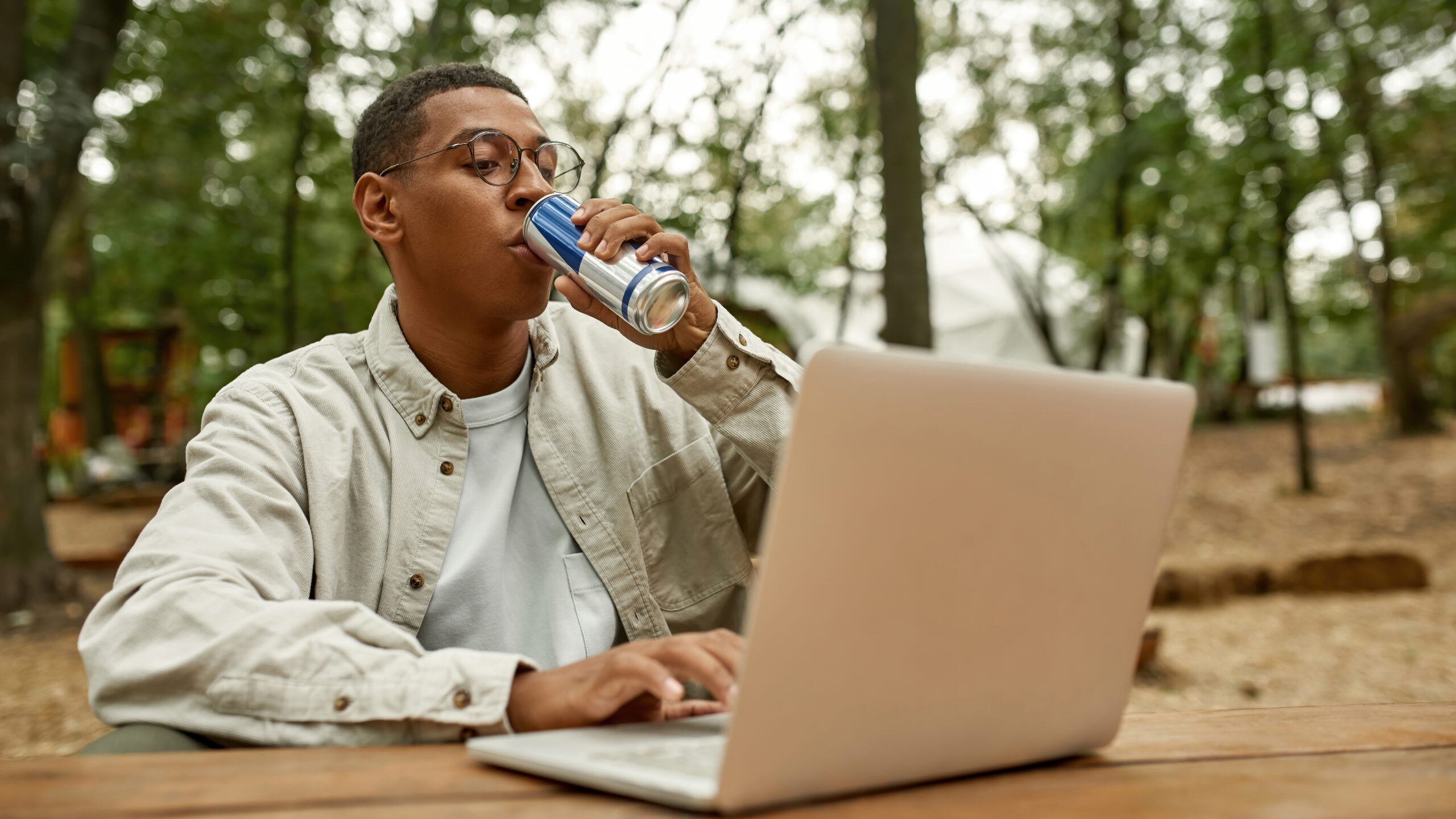Almost everyone has a stake in the coffee vs energy drinks debate. Even with the best intentions and a strict bedtime routine, a good night’s sleep isn’t always guaranteed. We’ve all succumbed to the lure of the late-night scroll, the temptation of just one more episode, or the pressure of a looming deadline. Life has a way of keeping us up when we need rest most. The result? We stumble into the next day feeling groggy, unfocused, and desperate for a pick-me-up.
Cue the two heroes of the modern-day energy crisis: coffee and energy drinks. Both promise to jolt us out of our morning fog and sharpen our focus. But which one reigns supreme? Let’s break it down.
Caffeine Content
Caffeine is the magic ingredient here—a naturally occurring stimulant that targets the nervous system, improving alertness and concentration. It’s found in coffee beans, tea leaves, cocoa beans, and kola nuts and is the world’s most widely consumed psychoactive substance.
The caffeine content varies depending on brewing methods and brands, but here are the typical averages:
Coffee:
- Brewed Coffee (8oz): 80-100 mg
- Instant Coffee (8oz): 62 mg
- Espresso (1oz): 63 mg (note: lattes and cappuccinos often have two shots)
Energy Drinks:
- Monster (240ml): 86.4 mg
- Red Bull (258ml): 77.4 mg
- Rockstar (240ml): 72 mg
- Tenzing (250ml): 80 mg (plant-based alternative with green tea and green coffee beans)
For a pure caffeine punch, brewed coffee takes the crown. When comparing Monster energy drink caffeine vs coffee, the cafetière brew typically packs a stronger hit. However, energy drinks still offer a potent boost in a quick, ready-to-go can.
When looking at caffeine in coffee vs Monster energy drink specifically, brewed coffee often has more caffeine, but Monster provides a reliable hit with each can. Energy drinks vs coffee caffeine comparisons like this are essential for understanding your preferred boost.
Sugar Content and Taste
Let’s be honest—taste plays a big role in our caffeine fix. Coffee and energy drinks cater to vastly different palates. Coffee is rich, bitter, and often served hot. Energy drinks are sweet, fizzy, and best served chilled.
Sugar content is where energy drinks often raise red flags. But coffee-based drinks can also creep into sugary territory, especially when loaded with syrups and flavoured toppings.
Let’s compare some popular choices:
Coffee (Starbucks Grande, ~16oz / 455ml):
- Americano: 0.1g sugar, 133.7mg caffeine
- Cold Brew: 0.1g sugar, 264.7mg caffeine
- Semi-Skimmed Latte: 14.2g sugar, 89.1mg caffeine
- Semi-Skimmed Cappuccino: 12.1g sugar, 89.1mg caffeine
- Java Chip Frappuccino: 43.2g sugar, 30.2mg caffeine
Energy Drinks:
- Monster Energy (500ml): 55g sugar, 160mg caffeine
- Red Bull (250ml): 27.5g sugar, 80mg caffeine
- Rockstar Original (500ml): 21g sugar, 200mg caffeine
- Tenzing Original (250ml): 11.25g sugar, 80mg caffeine
The verdict? If you’re looking to avoid a sugar crash, stick to black coffee or cold brew. They deliver caffeine without the added sugar. If bitterness isn’t your thing, adding a splash of milk or sweetener lets you control your intake.
Barista-style options like lattes and cappuccinos contain sugar naturally from milk. This is considered less harmful than “free sugars” (e.g., added sugars in energy drinks), which are linked to obesity, heart disease, and type 2 diabetes.
While many energy drinks now offer sugar-free versions, they rely on artificial sweeteners. These may be a better option than high-sugar drinks but still come with their own set of health debates.
Health Considerations
Caffeine is a powerful stimulant, but too much can lead to unwanted side effects like jitters, anxiety, heart palpitations, and disrupted sleep. Health authorities recommend a maximum daily caffeine intake of 400mg for adults (roughly four cups of brewed coffee), though individual tolerance varies widely.
Timing matters too. Consuming caffeine late in the afternoon can interfere with your sleep quality, trapping you in a cycle of fatigue and reliance on stimulants.
When comparing caffeine in energy drink vs coffee, it’s important to remember that energy drinks often combine caffeine with other stimulants and sugars, which can amplify side effects, whereas coffee provides a whole range of health benefits, with many studies suggesting it may shield you from common chronic conditions and even help you live longer.
Final Verdict: Coffee Vs Energy Drinks
When it comes to the ultimate pick-me-up, coffee edges out energy drinks as a more healthy, more customisable option. Black coffee or cold brew delivers caffeine without excess sugar, allowing you to tailor the strength and flavour to your preference.
Energy drinks, on the other hand, provide a convenient grab-and-go boost but often come with a heavy dose of sugar or artificial ingredients and preservatives. They can be helpful in a pinch but are best enjoyed occasionally rather than becoming a daily habit.
So, the next time you find yourself reaching for a boost, consider your priorities:
Convenience, or control?
Either way, your caffeine fix is ready and waiting when your workplace is equipped with a bean-to-cup commercial coffee machine or a cold drinks machine.
Whether it’s caffeine in coffee vs Monster energy drink or evaluating caffeine in energy drink vs coffee across brands, understanding the differences can help you make the best choice for your lifestyle.

